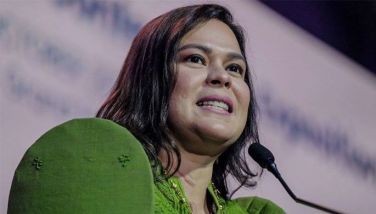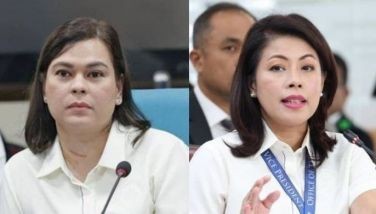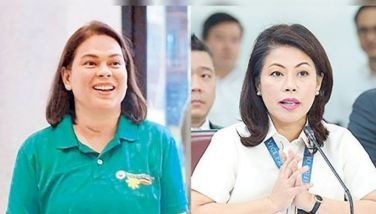Post-Estrada gov’t must carry out reforms – Almonte
November 8, 2000 | 12:00am
Former national security adviser Jose Almonte said Filipinos should start formulating empowering policies to form the base of national development programs and create safeguards against graft and corruption in government.
Saying the dismissal of the Estrada administration "is now only a matter of time," Almonte urged the succeeding government to carry out radical political and economic reforms. Otherwise, he said, the country would again have to go through the horse-trading that is routine in political transitions.
"This time civil society, big business and even the politicians are primed to accept substantive changes to prevent crises such as today’s from recurring," Almonte pointed out.
The former director-general of the National Security Council urged the next administration to incorporate lessons from 1986 to 2000.
"We must promote direct democracy – to give our people an orderly and constitutional way of correcting their political mistakes," Almonte stressed.
"And we must level the playing field of enterprise – as the only way of cutting off once and for all the collusion, corruption and nepotism that are paralyzing our country’s productive capacity," he added.
Almonte underscored that transitional democracy guarantees only the free choice of a President through a competitive election. The country’s mass electoral system, however, does not guarantee that voters choose the best leader, when the latter is necessary for nations where the state is weak and democratic institutions are still new and untried.
While the 1987 Constitution provides remedies for local electorates, and has been tested in peaceful recall exercises, Almonte stressed the need to make the same constitutional mechanisms applicable to national officials, including the President.
"The next administration must empower the national electorate to intervene expeditiously and peacefully in political crisis, such as the one we are experiencing," Almonte stressed.
Promoting direct democracy, he noted, will also increase the "political accountability" of all officials, whether elected or appointed.
At the same time, Almonte stressed the need to professionalize the administrative bureaucracy "to make it strong enough to resist the importuning of special interest groups."
The next administration, he said, must give life to the constitutional guarantee of "full public disclosure of all transactions involving public interest," by ensuring transparency of all its policies.
"Immediately, the next administration can reduce the State’s power to decide winners and losers in business by curtailing its own authority to award or withhold incentives, concessions, franchises and monopolies," Almonte said.
He averred that heavy-handed interventionism in the economy by a weak state, a practice abetted by protectionist provisions in the 1987 Charter, was a major reason for endemic problems like rent-seeking and crony capitalism.
"Wherever politicians rather than markets control economic access, there we will always find special interests trying to gain control of this non-market power," stressed Almonte.
Saying the dismissal of the Estrada administration "is now only a matter of time," Almonte urged the succeeding government to carry out radical political and economic reforms. Otherwise, he said, the country would again have to go through the horse-trading that is routine in political transitions.
"This time civil society, big business and even the politicians are primed to accept substantive changes to prevent crises such as today’s from recurring," Almonte pointed out.
The former director-general of the National Security Council urged the next administration to incorporate lessons from 1986 to 2000.
"We must promote direct democracy – to give our people an orderly and constitutional way of correcting their political mistakes," Almonte stressed.
"And we must level the playing field of enterprise – as the only way of cutting off once and for all the collusion, corruption and nepotism that are paralyzing our country’s productive capacity," he added.
Almonte underscored that transitional democracy guarantees only the free choice of a President through a competitive election. The country’s mass electoral system, however, does not guarantee that voters choose the best leader, when the latter is necessary for nations where the state is weak and democratic institutions are still new and untried.
While the 1987 Constitution provides remedies for local electorates, and has been tested in peaceful recall exercises, Almonte stressed the need to make the same constitutional mechanisms applicable to national officials, including the President.
"The next administration must empower the national electorate to intervene expeditiously and peacefully in political crisis, such as the one we are experiencing," Almonte stressed.
Promoting direct democracy, he noted, will also increase the "political accountability" of all officials, whether elected or appointed.
At the same time, Almonte stressed the need to professionalize the administrative bureaucracy "to make it strong enough to resist the importuning of special interest groups."
The next administration, he said, must give life to the constitutional guarantee of "full public disclosure of all transactions involving public interest," by ensuring transparency of all its policies.
"Immediately, the next administration can reduce the State’s power to decide winners and losers in business by curtailing its own authority to award or withhold incentives, concessions, franchises and monopolies," Almonte said.
He averred that heavy-handed interventionism in the economy by a weak state, a practice abetted by protectionist provisions in the 1987 Charter, was a major reason for endemic problems like rent-seeking and crony capitalism.
"Wherever politicians rather than markets control economic access, there we will always find special interests trying to gain control of this non-market power," stressed Almonte.
BrandSpace Articles
<
>
- Latest
- Trending
Trending
Latest
Trending
Latest
Recommended






























